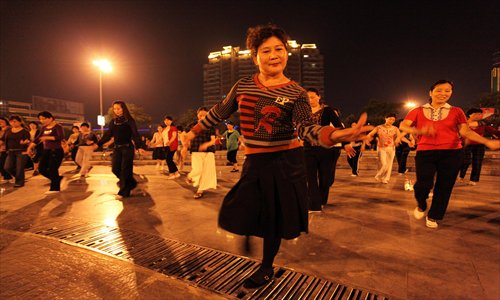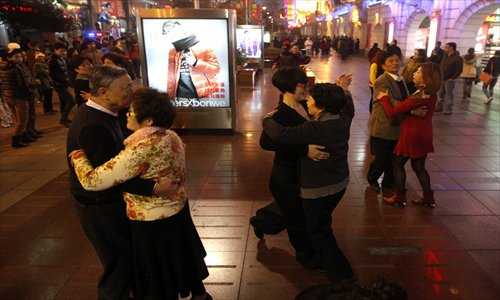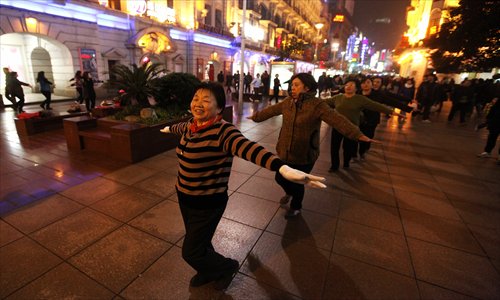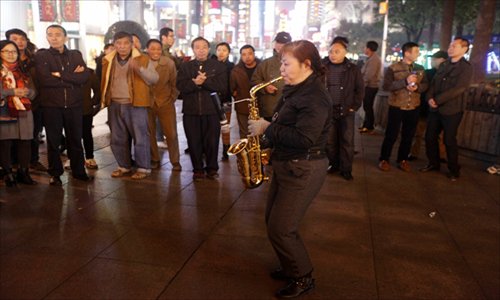Stepping out in style

Women enjoying a nighttime dance together Photo: IC
It was probably the worst day to be outside for months. The temperature had dipped to below 5 degrees, the wind came in gusts and the Air Quality Index was at 271, suggesting heavy pollution. On the streets people were walking quickly and covering their faces with scarves or masks.
But 80-year-old Zhang Rongxin was not going to be prevented from taking his favorite nighttime exercise. And so, just as he does nearly every day, after dinner he caught a metro from his home on Zhijiang Road West in Zhabei district to the city center and spent hours dancing on the Nanjing Road East pedestrian street.
For Shanghai resident Zhang arriving in front of the Yong'an Department Store to dance with his friends, who are aged between 45 and 80, has become a daily ritual. Tonight's dance was a casual affair. They danced in pairs to swing music for about half an hour, and then Zhang, looking chic in a black flannel suit and a gray fedora, started to twist with a younger woman as the music changed. Soon, a crowd of tourists surrounded the dancers, some voicing wonder at how a man of his age could dance so elegantly and adroitly.
Zhang and his friends are among the 100 million Chinese people who like dancing in public, CCTV has estimated. Over the past few years Chinese square dancing (guangchangwu) has quickly become a national hobby and in Shanghai's parks, public squares and areas in residential neighborhoods, public dancing has become commonplace.
So too is singing. A loudspeaker and amplifier, a portable DVD player, a few microphones and outdoor karaoke is there for everybody. From European bel canto to Huju Opera (a Shanghai style of Peking Opera), from patriotic songs to jazz and folk, Shanghai's elderly singers have a vast repertoire.

Couples try their traditional two-steps on Nanjing Road East. Photo: Cai Xianmin/GT
Fans enchanted
On this night on the pedestrian street, more than five groups are dancing, some trying Latin American, some doing an energetic type of line dancing and some favoring traditional ballroom styles. Most of the dancers are women but men can be seen occasionally. And somewhere near Shanxi Road South, a woman is singing traditional folk songs which blast out through a loudspeaker enchanting a crowed of fans who have surrounded her.
New Zealander Tuhoe Tamaiparea, a student at the Auckland University of Technology who was on a two-day visit in Shanghai, was one of the many onlookers. "I'm loving it. This is amazing. I think every city should have something like this. It's active, it's not compulsory, and it releases positive endorphins and gives the community something positive. Everybody looks so confident. I'm so inspired I want this to happen in New Zealand," the 21-year-old enthused.
He was so impressed that he joined in a session with 20 Chinese women on Nanjing Road East. He said he couldn't resist this after seeing them dancing while he was shopping.
But not everyone is happy about dancing and singing. Many find the square dancing scene unacceptable and complain about the noise. Some say that asking the dancers to run the music down or asking police to intervene is futile. Earlier this month in Fuzhou the disputes took a nasty turn when dancers found feces had been dumped on the square where they danced every night, and in August in Beijing, a man fired a gun into the air and then set his Tibetan mastiffs on to dancing neighbors.
In the blogosphere, square dancing has sparked opposition and scorn. Shanghai writer and commentator, Ge Hongbing, commented on Weibo, "Guangchangwu is of a fascist nature … It kills personality and beauty and only values order and form … Besides, these selfish old women think that their right to dance is above any other rights, and they don't care at all if other people are disturbed."
Xiao Yao, a columnist from Tianjin, also dislikes the trend. He said in a recent blog that square dances are "a mass nostalgia for the collectivist society through song and dance, and a desperate echo of the era of planned economy. Guangchangwu is a haven for those who are left breathless by the roller coaster of rapid economic development.
"In the country which boasts the largest population and largest number of public squares in the world, this is the only type of spontaneous public gathering that's not deemed illegal," he said.

Dancers follow the leader. Photo: Cai Xianmin/GT
Historical link
However, the elderly have other reasons for dancing in public and why this has become an important part of their lives.
Zhang Rongxin, for example, has a historical link. "I have been dancing for 65 years. Back in the 1940s, every big department store on Nanjing Road East had its own ballroom, and that was when and where I started my passion for dancing," he said, pointing out the Shanghai Fashion Store and the Yong'an Department Store, once two of the largest department stores in Shanghai before 1949 when they were known as the Sincere and Wing On stores.
During the Cultural Revolution (1966-76), all Western dancing was banned but Zhang danced at home with the music turned low or sometimes with no music at all. After China's opening-up, Zhang was happy to find that the ballrooms reopened.
But with the opening-up, a new music culture flooded in and as a result, pubs and bars began to replace the ballrooms. By the end of the 1990s, Zhang found himself again having nowhere to dance.
That was when he started dancing on Nanjing Road East. "Over 10 years ago, I was one of the first dancing on Nanjing Road East. Back then, there used to be a jazz band performing live outside the New World Department Store, and I danced to their music."
Others dance or sing for health. Linda Yu, who's been dancing for four years on Nanjing Road East, said, "I come here after work every day and dance for about an hour. Us old people don't have much to do at home except watch television. Dancing is great exercise."
Every week Mr Wang visits Heping Park in Yangpu district with a large loudspeaker and sound system, and lets his friends share open-air Huju Opera karaoke sessions. "I had nothing to do after retirement, until I found many people were doing this in the parks. So I spent several hundred yuan on this sound system and I bring it to the park every week. Anyone who's interested in Huju Opera is welcome to share the microphone."
The camaraderie
And there are some who come for the atmosphere and camaraderie. Since she discovered the karaoke sessions here four years ago Yu Na has been visiting Heping Park every week. The silver-haired 84-year-old woman said she went there every Sunday. "I look forward to it for the whole week and it really is the happiest time of my week."
This week she sang songs from a Huju Opera, and her performance was enthusiastically applauded by her friends in the park. "I have made a lot of friends here. And my children are happy to see me having my own hobbies and friends, so that they don't need to worry about me being lonely.
"Before I found out about this, my children and grandchildren took me to KTVs when I wanted to sing. But that was about once every month. Now I can sing every day, whenever I feel like coming here."
Xu Lianming, a professor of sociology at the School of Social Development, East China Normal University, said ageing was a major reason why public dancing and singing had become so popular in Shanghai. Shanghai is one of China's fastest ageing cities. From 2001 to 2005, an average 49,200 people annually turned 60. From 2011 to 2015, this has been projected to quadruple with more than 200,000 people a year turning 60.
By the end of 2012 in the city, more than 3.67 million people were 60 or older, about 25.7 percent of the population. The Shanghai Municipal Government has estimated that by 2015, 4.3 million people will be 60 or older, about 30 percent of the population and there will be 700,000 residents aged over 80.
"Although the government pays a lot of attention to their physical welfare, it should also care about their mental state," he said.

A busker plays a saxophone and dances to the music, attracting a crowd of onlookers. Photo: Cai Xianmin/GT
Concrete jungles
Urbanization is another reason for the popularity of singing and dancing in public. "The course of urbanization in China has disintegrated traditional, close-knit communities. People who live in modern neighborhoods in concrete jungles long for the old community spirit and neighborhood ties. Square dancing is probably a substitute for that kind of neighborhood connection."
Xu's colleague Professor Wen Jun, agrees. Wen researched guangchangwu as part of a study on the psychology of Chinese people.
"We went to 10 provinces for our research, and we found that the guangchangwu movement has spread from the cities to the counties and rural areas. Even farmers in some areas are joining in the dancing.
"It's not just about exercising, but a new form of mass culture. After China farewelled the planned economy, people no longer worked at collective factories or communes and as a result, Chinese society was increasingly fragmented. People want a sense of belonging and guangchangwu is an important platform for social interaction and for building up social networks, for people to regain their social identities."
China's vast population and a shortage of public space was another reason why public dancing was conspicuous. Wen pointed out that guangchangwu mostly attracts lower to middle class participants because it is a cheap way to exercise.
He doesn't agree with the Internet criticisms of public dancing. "For me, it's not about a reminiscence of collectivism. It's the liberation of the human spirit. It shows people now have more disposable time and freedom, and they have a better understanding of the importance of health."